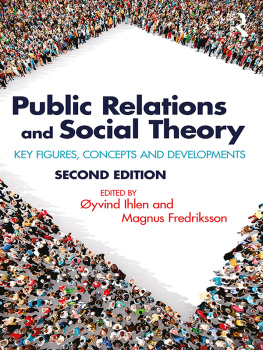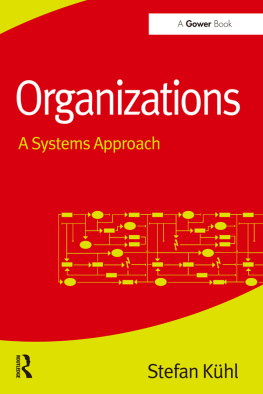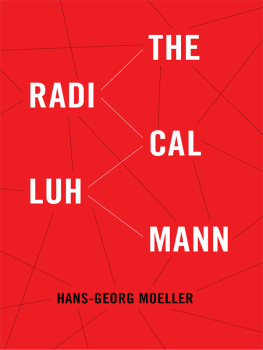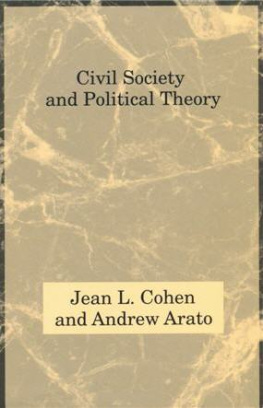THE RADICAL LUHMANN


Columbia University Press
Publishers Since 1893
New York Chichester, West Sussex
cup.columbia.edu
Copyright 2012 Columbia University Press
All rights reserved
E-ISBN 978-0-231-52717-0
Library of Congress Cataloging-in-Publication Data
Moeller, Hans-Georg, 1964
The Radical Luhmann / Hans-Georg Moeller
p. cm.
ISBN 978-0-231-15378-2 (cloth : alk. paper) ISBN 978-0-231-15379-9 (pbk. : alk. paper) ISBN 978-0-231-52717-0 (ebook)
1. Luhmann, Niklas, 19271998 2. Social systemsPhilosophy. 3. SociologyPhilosophy. I. Title.
HM701.M635 2012
301.092dc23
2011018977
A Columbia University Press E-book.
CUP would be pleased to hear about your reading experience with this e-book at .
References to Internet Web sites (URLs) were accurate at the time of writing. Neither the author nor Columbia University Press is responsible for URLs that may have expired or changed since the manuscript was prepared.
Book Design: Alejandro Largo
CONTENTS
It is striking that Niklas Luhmanns (19271998) social systems theory often provides the most advanced, adequate, and applicable models for understanding how things work in contemporary society. To give just one concrete example: in Globalization or World Society? How to Conceive of Modern Society? an article published in 1997, toward the end of his life, he not only answered these questions quite programmatically but also delineated in astonishing precision the economical developments that later led to the great financial crisis of 20082009.
Luhmann did not predict the crisis as such, but he did succeed in giving an account of the social context that was to make it possible. And he could do so because his theoretical approach radically departs from mainstream political theory, which, according to him, has been mainly concerned with the utopian ideals of happiness and solidarity. Luhmann proclaims: We have to come to terms, once and for all, with a society without human happiness and, of course, without taste, without solidarity, without similarity of living conditions. It makes no sense to insist on these aspirations, to revitalize or to supplement the list by renewing old names such as civil society or community. He appeals to social theorists to give up certain latent idealist and moralist pretensions: Sociologists are not supposed to play the role of the lay-priests of modernity. According to Luhmann, the moralist tendency of a good deal of social and political thought is rooted in theoretical backwardness. The lay-priests of social theory still think of society in terms of the grand masters of the eighteenth and nineteenth centuries, namely in terms of stratification, that is, of a society divided into classes of oppressors and oppressed. He writes: If we see stratification we will tend to see injustice, exploitation and suppression; and we may wish to find corrective devices or at least to formulate normative schemes and moral injunctions that stimulate a rhetoric of critique and protest.
This change of perspective from that of the lay-priests to that of the radical theoretician is what I explore in this book. Or, in other words, I try to counter misinterpretations of Luhmanns theory, which, as Michael King said, failed to recognize its radical nature and the paradigm that it introduces. But let me first go back to how, in 1997, Luhmann outlined the social conditions of a financial crisis that occurred long after his death.
In a global society based on functional differentiation, international, indeed, no longer refers to a relation between two (or more) nations but to the political and the economic problems of the global system. In a radically deregionalized world society, all internal boundaries depend upon the self-organization of subsystems and no longer on an origin in history or on the nature or logic of the encompassing system. This leads to a situation in which world society has reached a higher level of complexity with higher structural contingencies, more unexpected and unpredictable changes (some people call this chaos) and, above all, more interlinked dependencies and interdependencies. This means that causal constructions, (calculations, plannings) are no longer possible from a central and therefore objective point of view.
Within such a chaotically complex society, there is no longer a quasi cosmological guarantee that structural developments within function systems remain compatible with each other. This means, for instance, that the highly efficient modern medicine has demographic consequencesthat is advances in medicine lead to all kinds of social and economic problems, such as an imbalance in numbers between the old and the young and increasing health care costs. Similarly, the new centrality of international financial markets, the corresponding marginalization of production, labour, and trade, and the transfer of economic security from real assets and first rate debtors to speculation itself, leads to a loss of jobs and seduces politicians to promise jobs (without markets?)that is, the virtualization of the economy, the shift to an economy that focuses on financial products rather than goods creates immense wealth (for some) but undermines the traditional couplings of the economy with, for instance, infrastructure, means of production, labor, the legal system, and politics. In this way, society faces a novel volatility of the financial market with its new derivative instruments for simultaneously maximizing security and risk with unpredictable effects. In other words: The economic system has shifted its bases of security from property and reliable debtors (such as states or large corporations) to speculation itself. He who tries to maintain his property will lose his fortune, and he who tries to maintain and increase his wealth will have to change his investments one day to the next. He can either use new derivative instruments or must trust some of the many funds that do this for him. For Luhmann, all this cannot be explained on the basis of the traditional vocabulary of exploitation or with moralist categories such as greed.
The developments in the financial sector of the economy and the nearly catastrophic effects of these developmentson the education system in Ireland, for instancequite clearly demonstrate that Luhmann was right when he said: we are not in a phase of posthistoire but, on the contrary, in a phase of turbulent evolution without predictable outcome.
So, what is the problem? And, moreover, how do we have to change our point of view so that we are better able to see it? The following chapters explore Luhmanns paradigm shift from philosophy to theory that opens up new perspectives on the contemporary world.
I begin my exposition with an attempt to characterize the very social system within which Luhmanns writings were produced, that is the German academic scene of the last decades of the twentieth century. Within this social environment, Luhmann was able to succeed despite, or perhaps because of, the challenges he posed to Habermass dominating doctrine of a society based on domination-free discourse (herrschaftsfreier Diskurs). Luhmann offered a radical alternative to this normative political philosophy. He conceived of his theory as a subversive Trojan horse that, once inside the enemys camp, might destroy them from within. I argue that one of the tactics employed by Luhmann to disguise this threat was his often rather convoluted writing style. By adopting the jargon of Habermas and others who constituted the academic elite of the time, Luhmann was granted entry into their Troy.
Next page











